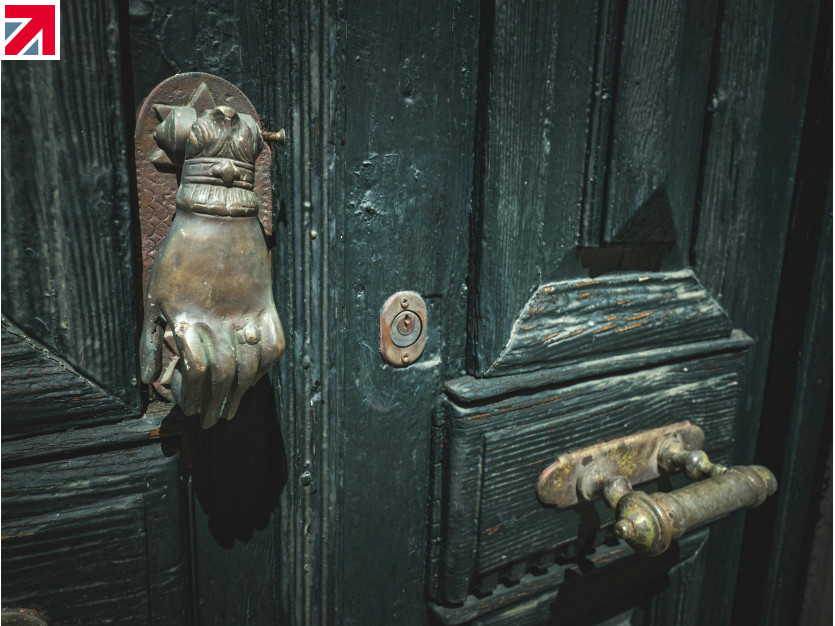Right. We make door handles for a living, so we probably think about them more than is healthy. But over 35 years, you pick up some genuinely interesting stuff. The kind of facts that make you look at door handles differently.
Here are seven things that surprised us - and will probably surprise you too.
1. Brass Handles Actually Kill Bacteria
Not marketing. Actual science. Brass has antimicrobial properties. Bacteria and viruses die on brass surfaces significantly faster than on stainless steel or chrome.
This is why hospitals traditionally used brass door furniture. Not for the look - for infection control. The technical term is the "oligodynamic effect." Copper ions in brass (and bronze, and copper itself) are toxic to bacteria. Research shows that bacteria can die within minutes to hours on brass surfaces, while on stainless steel, they can survive for days or even weeks (Oligodynamic Effect Research). The U.S. Environmental Protection Agency registered copper alloys as the first solid antimicrobial materials in 2008 (EPA Registration).
So all those Victorian buildings with brass handles? They were accidentally more hygienic than many modern buildings with chrome. COVID made people rediscover this. We had enquiries for brass and copper handles spike in 2020-2021. Turns out the Victorians knew something we'd forgotten.
2. The Modern Door Knob Patent Is From 1878 (But They Existed Before)
In 1878, an African American inventor named Osbourn Dorsey patented an improved door-closing mechanism that became the foundation for modern door knobs (US Patent #210,764).
He was just 16 years old at the time. But here's the thing - door knobs definitely existed before this patent. Victorian homes from the 1850s and 60s had door knobs. What Dorsey patented was an improvement to the internal mechanism. Before widespread use of door knobs and handles with mechanisms, most doors used latches, bolts, or just pushed open. If you were wealthy, you had a lock and key. If you weren't, you used a leather thong threaded through a hole in the door.
The industrial revolution made door handles affordable enough for ordinary buildings. Before that, if you wanted a fancy door, you had a servant open it for you.
3. Round Door Knobs Are Being Phased Out For Good Reason
If you've got arthritis, a round door knob is basically impossible to use. Same if you're carrying shopping, you've got wet hands, or limited grip strength.
This is why building regulations now prefer - or in some cases require - lever handles for accessibility. The Americans were ahead on this. Their ADA (Americans with Disabilities Act) effectively made round knobs unsuitable for public buildings back in 1990.
UK building regulations have followed suit. Most commercial buildings now specify lever handles as standard. Round knobs look nice. They're just not great at their actual job if you've got any kind of mobility issue. We still make them for residential projects where people specifically want them. But for commercial? Levers every time.
4. There's A British Standard For How Hard A Handle Should Be To Operate
BS EN 1906. Not exactly bedtime reading.
But there are actual regulations about how much force you should need to pull or push a door handle. Too stiff and people with limited hand strength can't use it. Too loose and it feels cheap and breaks quickly.
The standard specifies durability grades, corrosion resistance, fire performance, and operating force requirements (BS EN 1906 Standard). Grade 3 is for light domestic use. Grade 4 is for heavy commercial use. When we say a handle is "commercial grade," this is what we mean. It's not marketing - it's an actual tested specification.
5. Brass Needs To Be Uncoated To Work As An Antimicrobial
Here's the catch with brass's bacteria-killing properties: it only works if the brass is actually exposed. If your brass handle has a lacquer coating (which many do, to prevent tarnishing), the antimicrobial properties are basically nil.
The copper ions need direct contact with bacteria to work. A lacquer layer blocks this. This is why some hospitals and public buildings are going back to unlacquered brass. Yes, it tarnishes. Yes, it needs more maintenance. But it actually kills bacteria. The trade-off: looks vs hygiene. For residential, most people choose lacquered brass because they want it to stay shiny. For hospitals and care homes, unlacquered is becoming more common.
6. Commercial Door Handles Are Engineered Completely Differently
A handle on your front door at home might get used 20 times a day. Maybe 7,000 times a year. An office building entrance? Easily 500-800 uses per day. Over 200,000 uses per year.
Now consider that commercial handle needs to still work perfectly in year 10. That's potentially 2 million uses. This is why commercial door furniture costs more than residential. It's not just "fancy" - it's engineered for a completely different level of mechanical stress. Different materials, different internal mechanisms, different testing standards. A residential handle installed in a commercial environment will fail. Usually within a year.
7. Fire Door Handles Have To Fail Safely
Fire doors need to open easily from the inside, always, no matter what. But they also need to stay closed to stop fire and smoke spreading.
This creates an engineering challenge. The handle mechanism needs to be strong enough to hold the door closed against the closer mechanism, but easy enough to operate in an emergency. There are specific regulations about the maximum force needed. If someone's panicking and needs to get out, they can't be fighting with a stiff handle. We work with fire door specialists regularly. Get the specification wrong and you fail building control. Or worse - someone can't get out when they need to.
It's more technical than people realise.
What Did We Learn?
Brass kills bacteria through actual science, not magic. Door handles have interesting accessibility history. Standards exist for literally everything, including how hard you should have to push.
Not as glamorous as some industries. But more interesting than you'd think. Next time you pull a door handle, you'll probably think about it differently.
Or you won't. Either way, at least now you know. We've been making door furniture for 35 years. If you need handles for a project - standard or unusual - we're here to help.
www.ashdoorfurniture.co.uk
Find out more about ASH DOOR FURNITURE & ENTRANCE SPECIALISTS LTD on their member profile page here
Member-created content 3 days ago | From members

